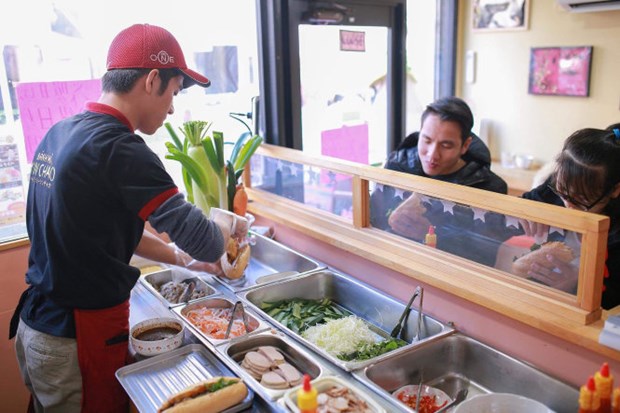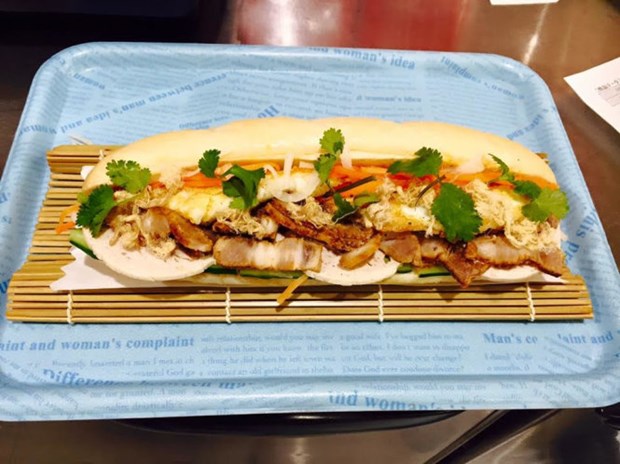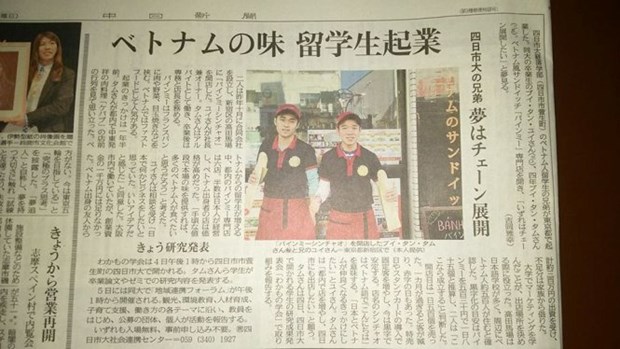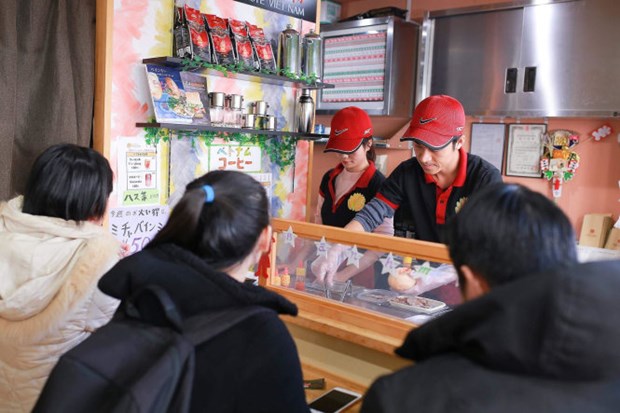
Inside ‘Xin Chao’ on Waseda-dori Avenue, Tokyo, Japan.
The
store, ‘Xin Chao’ (Hello), was launched last October by Bui Thanh Duy, 31, and
Bui Thanh Tam, 26, on the avenue of Waseda-dori in the Japanese capital.
It
offers diners the taste of ‘banh mi,’ or Vietnamese sandwich, one of the most
globally popular Vietnamese dishes, second perhaps only to ‘pho’ (beef noodle
soup).
In
2011, the term banh mi was deemed ubiquitous enough in everyday conversation to
be added to the Oxford English Dictionary’s canon of existing English words.
The
store and its Vietnamese owners have been featured in Chunichi, a leading
Japanese daily.
Over
a Skype call, Tam told Tuoi Tre (Youth) newspaper his story of running a
catering business offering Vietnamese cuisine in a foreign land.

A loaf of banh mi, or Vietnamese sandwich, at ‘Xin Chao’ Store on Waseda-dori Avenue, Tokyo, Japan. Photo: Tuoi Tre
A smooth start
It
all began in June 2015, when Tam visited a market in Tokyo and saw a long line
of customers waiting at a store selling Turkish kebabs.
“I
bought one portion to try out the food,” Tam recalled. “It was tasty, but
definitely not as delicious as Vietnamese banh mi. After that, I started
contemplating the idea of opening a banh mi store in Japan, which was supported
by both my brother and other members of my family.”
The
most challenging part for foreigners to open a business in Japan is that they
will need to prove they have never broken a law, have enough money to keep the
business running or pay debts when it does not go well, and have a Japanese
guardian, Tam said.
The
siblings managed to rent a 22-square-meter location on Waseda-dori Avenue in
Tokyo for nearly US$3,000 per month.
“We
were lucky to have a Japanese professor agree to be our guardian,” Tam said.
“He was worried at first, but he was overcome with joy and pride upon seeing
our store being featured on Japanese television and in local newspapers.”
They
had to borrow money from family members and friends to renovate the location
and cover the initial costs of ingredients, electricity and gas.
“On
the opening day, we sold over 500 loaves of banh mi despite having only
advertised the store on social media and via leaflets,” Tam said. “Everything
is going well, and we’re looking to turn the business into a chain in Japan.”
‘Xin
Chao’ now sells around 200 loaves of banh mi every day, which is “beyond [the]
wildest expectations” of Duy and Tam.

An article about ‘Xin Chao’ Store in a Japanese newspaper. Photo: Thanh Tam
The hunt for
Vietnamese baguettes
According
to Tam, one of their most difficult tasks when opening the store was to search
for a supplier of Vietnamese baguettes, the single most important ingredient in
a Vietnamese banh mi.
“In
Japan, they mostly make French-style baguettes, which have a thick crust and
are not as fluffy as the Vietnamese bread,” Tam explained. “Most bakeries would
only agree to supply Vietnamese baguettes if we could buy at least 10,000
loaves a day, as their production line is fully automated for mass production.”
Luckily,
the brothers managed to find a bakery which not only consented to make
Vietnamese baguettes but was also attentive to detail to replicate as closely
as possible the Vietnamese taste of a baguette.
According
to Tam, there are around seven stores selling banh mi in Tokyo, most of which
are run by Japanese owners, so their strategy to attract customers is to offer
eaters the full taste of a loaf of banh mi from central Vietnam’s Hoi An City,
stuffed with ham, cucumber, pâté and butter.
“I
want to promote the image of a beautiful Vietnam and elegant Vietnamese people
to international friends at all costs,” Tam said. “And I hope to achieve that
goal through these loaves of tasty banh mi.”

Customers wait to be served banh mi at ‘Xin Chao’ Store on Waseda-dori Avenue, Tokyo, Japan. Photo: Tuoi Tre
By Tuoitrenews